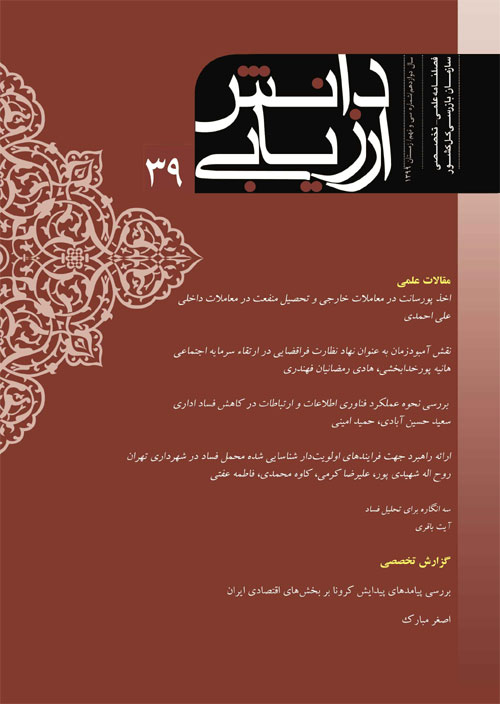Role of NGOs in Preventing and combating corruption in the executive bodies of Sistan and Baluchestan province
Author(s):
Abstract:
The present study applies a descriptive-analytical approach and field research to analyze the role of NGOs in preventing and fighting corruption in the executive systems in Sistan and Baluchistan Province. The research statistical population includes all members of NGOs and executive systems of Sistan and Baluchistan Province. Using purposing judgment sampling the directors and deputies of NGOs and executive systems are given Likert 14-item questionnaires of five options to gather information about the system. They are also provided with Likert 36-item questionnaires of five points to gather data about NGOs. The 84 questionnaires are distributed among the executive organizations and 30 questionnaires among NGOs. The narrative of the study is content type. Using Cranach's alpha coefficient, the reliability is estimated %88 for the questionnaires considered for organizations and %84 for the questionnaires considered for NGOs. Chi-square and Friedman tests are used to analyze the research questions. Worthy mentioning that, the whole statistical analysis is performed by SPSS software, version 19. The results from findings show that the organizations of Sista and Baluchistan Province play an important role in preventing the corruption in executive systems. Ranking the systems, in terms of prevention, shows that government regulatory institutes in cooperation with NGOs are in the first place; government regulatory organizations are in the second place, mass media in third place, and NGOs in fourth place. Management capabilities, human resources and finance NGOs are ranked at the first level in case of preventing corruption, support capabilities are moderate. Ranking the systems, in terms of fighting corruption shows that the government regulatory systems stand in first place, government regulatory systems in cooperation with NGOs stand in second place, mass media are ranked number three, and NGOs are rankednumber four. Management capabilities, human forces, support and financial capabilities of NGOs are of the highest importance in terms of fighting the corruption. The results from the data gathered from Sistan and Baluchistan NGOs suggest that NGOs have a low capacity in terms of funding and support, while human resources enjoy a high capacity in terms of preventing corruption in this province. Ranking the capacity and capability of NGOs in preventing corruption shows that the capacity of human resources is in the highest rank, then supporting capacity stands in third place. Ranking the major activity of NGOs in preventing corruption indicates that providing public trainings are of the highest importance in reporting corruption, reporting news and information about corruption in governmental and non-governmental organizations are ranked number two, and considering the suggestions resulted from effective reports are ranked number three. Furthermore, anti-corruption aspects are very important for NGOs.
Keywords:
Language:
Persian
Published:
فصلنامه دانش ارزیابی, Volume:6 Issue: 19, 2014
Page:
81
https://magiran.com/p1322959
دانلود و مطالعه متن این مقاله با یکی از روشهای زیر امکان پذیر است:
اشتراک شخصی
با عضویت و پرداخت آنلاین حق اشتراک یکساله به مبلغ 1,390,000ريال میتوانید 70 عنوان مطلب دانلود کنید!
اشتراک سازمانی
به کتابخانه دانشگاه یا محل کار خود پیشنهاد کنید تا اشتراک سازمانی این پایگاه را برای دسترسی نامحدود همه کاربران به متن مطالب تهیه نمایند!
توجه!
- حق عضویت دریافتی صرف حمایت از نشریات عضو و نگهداری، تکمیل و توسعه مگیران میشود.
- پرداخت حق اشتراک و دانلود مقالات اجازه بازنشر آن در سایر رسانههای چاپی و دیجیتال را به کاربر نمیدهد.
In order to view content subscription is required
Personal subscription
Subscribe magiran.com for 70 € euros via PayPal and download 70 articles during a year.
Organization subscription
Please contact us to subscribe your university or library for unlimited access!


